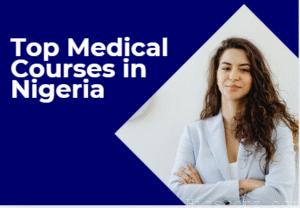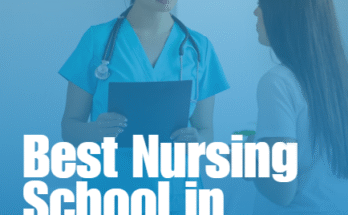In Nigeria, a career in medicine isn’t just a dream, it’s a mission. Every year, thousands of students fiercely compete for limited slots in medical schools across the country. But healthcare is much broader than many realize. Beyond the popular MBBS, there are other vital and rewarding medical courses that play key roles in saving lives and improving well-being.

Whether you see yourself wearing the white coat as a surgeon, using tech to scan the human body as a radiographer, developing life saving drugs as a pharmacist, or caring for patients as a nurse, there’s a medical path that matches your passion and strength.
This guide explores some of the top medical courses available in Nigerian universities. You’ll discover what each one is about, how to qualify, how to choose what suits you best, and what kind of careers they can lead to both in Nigeria and beyond. If you’re ready to find your place in the future of healthcare, you’re exactly where you need to be.
Why You Should Consider a Medical Course
Choosing a medical related course goes far beyond the job title or salary, it’s about contributing to a healthier world. In Nigeria, the need for qualified healthcare workers is growing rapidly. Diseases, limited infrastructure, and an expanding population mean professionals in this field are not only in demand but are critical to national development.
By studying a medical course, you’re preparing to serve in roles that can save lives, shape public health policies, discover medical breakthroughs, and support healing at every stage of care. It’s also a career path that gives you mobility, many Nigerian trained professionals are now practicing in the UK, Canada, the US, and other parts of the world. Additionally, many medical courses offer a blend of science, hands on practice, and human connection, making the field both intellectually challenging and emotionally fulfilling. Whether you like working with people, solving puzzles, using technology, or managing systems, there’s a medical path that fits.
Admission Requirements for Medical Courses in Nigeria
Getting into a medical program in a Nigerian university is no small feat. These courses are competitive, and you’ll need to meet both academic and examination standards to be considered. Here’s what most universities require:
- O’Level Results: You need at least five credit passes in English Language, Mathematics, Biology, Chemistry, and Physics. These must be obtained in one or two sittings, depending on the institution.
- UTME Subjects: Candidates must write the Unified Tertiary Matriculation Examination (UTME) with subjects typically including English Language, Biology, Chemistry, and Physics. Scoring above 250 increases your chances, MBBS and Nursing especially demand high marks.
- Post-UTME/Screening: After UTME, candidates are screened through a post UTME exam or point-based system that combines UTME score, O’Level grades, and sometimes interviews.
- Other Requirements: Some universities might request physical fitness, medical checks, or aptitude tests. Courses like Nursing or Physiotherapy may have additional screening to assess emotional and physical readiness.
Keep in mind, private and state universities may have slightly different cut off marks or screening processes, but the basic subject combinations and credit passes remain consistent across the board.
See also: The Best Nursing Schools in Nigeria
Some of the Top Medical Courses in Nigerian Universities
1. Medicine and Surgery (MBBS)
When most people think of a medical career, this is usually what they picture. MBBS stands for Bachelor of Medicine, Bachelor of Surgery. It’s the course that trains you to become a general medical doctor. It takes about six years of classroom lectures, lab work, and hospital rotations, followed by one year of internship and another for NYSC. You’ll cover everything from diagnosing diseases to carrying out surgeries, managing emergencies, and offering long-term care to patients.
Picture this; you’re in the emergency room, and a patient’s life is in your hands. That’s the kind of responsibility and impact MBBS graduates face daily. Top universities offering MBBS include University of Ibadan (UI), University of Lagos (UNILAG), Obafemi Awolowo University (OAU), Ahmadu Bello University (ABU), and University of Nigeria Nsukka (UNN).
2. Dentistry
Dentistry focuses on oral health, teeth, gums, jaw, and everything related. But it’s more than cleaning or filling teeth. Dentists diagnose oral diseases, correct jaw irregularities, and even perform surgeries. The program runs for six years and covers a wide range of skills from oral surgery to dental prosthetics. Picture helping a young child regain confidence through a simple dental procedure, that’s the type of change a dentist can bring. You can study Dentistry at the University of Benin (UNIBEN), University of Lagos (UNILAG), and Obafemi Awolowo University (OAU).
3. Nursing Science
Nursing is at the heart of healthcare. In Nigeria, the five year course equips students with skills in patient care, midwifery, emergency response, and health education. Modern day nurses aren’t just assistants, they’re leaders in hospitals, coordinators during health crises, and sometimes the first responders in rural areas. They interpret medical readings, assist in surgeries, and manage patient care from admission to discharge. Top choices for nursing programs include the University of Nigeria Nsukka (UNN), University of Ibadan (UI), Nnamdi Azikiwe University (UNIZIK), and University of Calabar (UNICAL).
4. Pharmacy
Pharmacy is all about the science and management of drugs. It’s a five year course that teaches how medications are developed, how they work in the body, and how to dispense them safely. Pharmacists play a major role in managing chronic illnesses, giving drug advice, and ensuring patients avoid harmful drug combinations. Imagine being the expert who helps prevent dangerous side effects or assists a community with accurate medical information. Top pharmacy schools include the University of Benin (UNIBEN), University of Ibadan (UI), University of Lagos (UNILAG), and Ahmadu Bello University (ABU).
5. Medical Laboratory Science
This five year course trains professionals to identify diseases through lab testing. Whether it’s checking blood samples for infections or analyzing tissues for signs of cancer, lab scientists work behind the scenes to make accurate diagnoses possible.Without them, many health conditions would go undetected or be misdiagnosed. Their work is critical to every hospital and clinic. You’ll find solid MLS programs at the University of Calabar (UNICAL), Nnamdi Azikiwe University (UNIZIK), and University of Jos (UNIJOS).
6. Radiography
Radiography is the use of imaging tools like X rays, CT scans, and MRIs to diagnose diseases. It’s a five year course where students learn to operate imaging equipment and understand body structures through images. Radiographers work closely with doctors to spot internal injuries, tumors, or bone fractures. Their work helps doctors make faster and more accurate decisions. Good universities for Radiography include the University of Lagos, Nnamdi Azikiwe University, and University of Maiduguri.
7. Physiotherapy
Physiotherapy helps patients regain strength and movement after injuries, strokes, or surgeries. The five year course teaches students how to design physical recovery plans using exercises and manual therapy. Physiotherapists work with people who have mobility issues, helping them improve their daily lives. They’re essential for long term recovery. You can study this course at the University of Ibadan, Obafemi Awolowo University, and Bayero University Kano.
8. Optometry
Optometry deals with eye health and vision care. It’s a six year course that includes diagnosing eye conditions, prescribing lenses, and managing diseases like glaucoma. Optometrists often make the difference between someone going blind or retaining their vision. In areas without many specialists, one optometrist can transform hundreds of lives. You can study Optometry at Imo State University (IMSU), Abia State University (ABSU), and University of Ilorin (UNILORIN).
9. Anatomy and Physiology
Anatomy and Physiology are foundational medical sciences. Anatomy focuses on body structure, while physiology explains how the body functions. These four year courses are ideal for students interested in teaching, research, or continuing into medicine. Graduates often go into labs, lecture halls, or research teams working on new medical discoveries. You’ll find these courses at the University of Port Harcourt, University of Ilorin, and Delta State University.
10. Public Health
Public Health is all about preventing illness and promoting health in communities. It’s a four to five year program that includes health education, environmental health, and disease control. Instead of treating one patient at a time, public health workers focus on larger groups, running immunization drives, fighting epidemics, and shaping health policies. Top public health schools include the University of Ibadan, Obafemi Awolowo University, and University of Nigeria Nsukka.
How to Choose the Right Medical Course for You
With so many options in healthcare, it’s important to choose a course that matches your abilities, interests, and long term goals. Here’s how to find the best fit:
1. Know Your Strengths: If you enjoy talking to people and helping directly, Nursing or Physiotherapy could be perfect. If you’re good with numbers, chemistry, or analysis, Pharmacy or Medical Laboratory Science might suit you. If you love gadgets and are curious about imaging or visuals, Radiography or Optometry may appeal to you.
2. Think About Your Tolerance for Pressure: MBBS and Dentistry are longer and more intense. Other programs like Public Health or Anatomy may be less physically demanding but still intellectually deep.
3. Consider Future Opportunities: Ask yourself; Do I want to work abroad eventually? What kind of lifestyle do I see for myself? Do I want a role with more flexibility or a strict hospital setting?
4. Research Each Course: Check the curriculum, job options, and what daily work in that field looks like. Read blogs, watch YouTube videos, or talk to professionals already working in your area of interest.
5. Listen to Yourself, Not Just Society: Don’t pick MBBS just because it sounds prestigious. Every healthcare professional plays a vital role and job satisfaction matters more in the long run.
Career Opportunities After Graduation
The beauty of medical-related courses is that they lead to a wide variety of professional paths. Some are clinical and hands on, while others are research based or policy driven. Here’s a breakdown of what you can do after graduation:
- Medicine and Surgery Graduates can become general practitioners, pursue specialties, go into hospital administration, teach in universities, or take exams to practice abroad (like PLAB or USMLE).
- Nursing Graduates can work in hospitals, schools, military health units, NGOs, or even travel abroad as registered nurses (especially in countries like Canada and the UK).
- Pharmacists may work in retail, hospitals, or join pharmaceutical companies in drug development and marketing. They can also venture into academic research or establish their own pharmacies.
- Medical Laboratory Scientists have opportunities in diagnostic labs, fertility clinics, research institutes, and public health labs. Some move into biotech firms or pursue postgraduate education.
- Radiographers and Optometrists can work in hospitals, diagnostic centers, private practices, or become equipment consultants for imaging firms.
- Public Health Graduates are valued in policy making, international health organizations (like WHO or UNICEF), health journalism, data analysis, and program coordination for health interventions.
- Anatomy and Physiology Graduates often become researchers, educators, or transition into other specialties in postgraduate school.
- Physiotherapists can work with athletes, in orthopedics, or open private clinics. The global demand for this role is increasing, particularly in rehabilitation focused health systems.
In all cases, there’s room for entrepreneurship, consultancy, further studies, or even switching to tech driven health fields like health informatics.
Important note
This article is meant to serve as a general guide for informational purposes only. While we’ve taken care to present accurate and up to date content, readers should understand that course offerings, admission requirements, and program structures may vary across universities and are subject to change. The medical courses listed here reflect commonly available options in Nigerian institutions, but they do not represent an exhaustive list. Additionally, the universities mentioned are not ranked or exclusive; many other accredited institutions also offer these programs. Admission policies, cut off marks, and curricula can differ slightly between schools and from year to year. Therefore, we strongly advise all prospective students to consult official university websites, the JAMB brochure, or recognized education authorities to confirm details before making any application or academic decisions.
Conclusion
Choosing a medical course is not just about picking a career, it’s about identifying where your strengths, interests, and purpose meet. The truth is, medicine isn’t limited to the person holding the scalpel or writing prescriptions. From radiographers capturing life saving images, to pharmacists ensuring the right medication is given, to public health professionals preventing disease outbreaks, every role matters.
What makes a career in medicine truly rewarding isn’t just the respect or job security. It’s the knowledge that your work, whether seen or unseen, can improve or even save lives. It’s the opportunity to grow constantly, to specialize, to research, and to impact individuals, families, and communities on a meaningful level. As you weigh your options, think long term. Ask yourself what kind of work you enjoy, what kind of environment motivates you, and what kind of legacy you want to leave behind. Whether you’re drawn to patient care, diagnostics, lab work, health education, or medical research, there’s a place for you in healthcare. In the end, what matters most is not which course sounds the most prestigious, but which one you’ll wake up every day feeling proud and fulfilled to pursue.
Frequently Asked Questions (FAQs)
1. What medical course is best to study in Nigeria?
There’s no “best” course for everyone, it really depends on what you enjoy and what your strengths are. MBBS is popular, but Nursing, Pharmacy, Physiotherapy, and even Medical Laboratory Science all offer great careers. Pick the one that feels right for you.
2. Which universities are good for medical courses?
Some well known schools include the University of Ibadan, UNILAG, OAU, ABU, and UNN. But they’re not the only ones. Many accredited universities; federal, state, and private offer solid programs. Just be sure the course is approved by NUC or relevant professional councils.
3. What do I need to get into a medical course in Nigeria?
Generally, you’ll need five credits in English, Maths, Biology, Chemistry, and Physics at O’Level, plus a good UTME score in related subjects. Each school has its own process, so check their admission details.
4. Is MBBS the only course with good job opportunities?
Not at all. Nursing, Pharmacy, MLS, Radiography, and Public Health all offer solid careers. Some even have more flexible job options or faster entry into the workforce.
5. Can I switch courses if I change my mind later?
Sometimes. Some universities allow students to switch, but it depends on your performance and available space. Always talk to your department first.
6. How long does it take to study these medical courses?
MBBS and Optometry take about 6 years. Pharmacy, Nursing, MLS, and Radiography usually take 5 years. Public Health and Anatomy often run 4–5 years.
7. Do I need Physics in UTME for medical courses?
For most science based health courses, yes. But a few, like Public Health, might be flexible. Always confirm with the school or check JAMB’s brochure.
8. Is Maths compulsory?
It usually is for O’Level. For UTME, it depends on the course. Still, having good math skills helps in many areas of health sciences.
9. Can I study a medical course with an arts or commercial background?
No, medical courses need a science foundation. You’d need Biology and Chemistry at the very least.
10. How do I choose the right university for a medical course?
Look beyond just rankings. Check for accredited programs, good facilities, a teaching hospital, and whether the environment suits you.
11. Are there private universities that offer medicine and health courses?
Yes! Many private universities now run accredited programs in MBBS, Nursing, and more. They usually have smaller class sizes but higher tuition.
12. Which medical careers pay the most?
Doctors, pharmacists, dentists, and some specialists often earn more. But it varies depending on where you work and your experience.
13. Can I specialize in health without MBBS?
Yes. You can specialize in things like physiotherapy, optometry, or public health without studying medicine.
14. Can I work while studying a medical course?
It’s tough. These courses are demanding. You might manage part time work in lighter programs, but it’s not easy with courses like MBBS.
15. Can I start a business as a health graduate?
Definitely. Many graduates run pharmacies, diagnostic centers, health blogs, or even build startups in health tech or wellness.
16. What if I don’t get into MBBS, should I try something else?
Yes. If you’re passionate about healthcare, consider other related courses. Many successful professionals didn’t start with MBBS. You can always try again later or find another path that suits you even better.
17. Can I work abroad with a Nigerian medical degree?
Yes, but you’ll need to meet the requirements of the country you’re moving to. That might include licensing exams or bridging programs.
Related Post
- Effective Study plan for Nigerian students
- Factors that can Improve Educational System in Nigeria
- Online Learning Courses For Nigerian Students
- The cheapest Countries for Nigerian students
- How Nigerian students can study abroad
- The best Countries for Nigerian students to Study abroad
- Courses that can boast your Career Opportunities Abroad
- The Easiest Courses Nigerian Students Can Study Abroad


